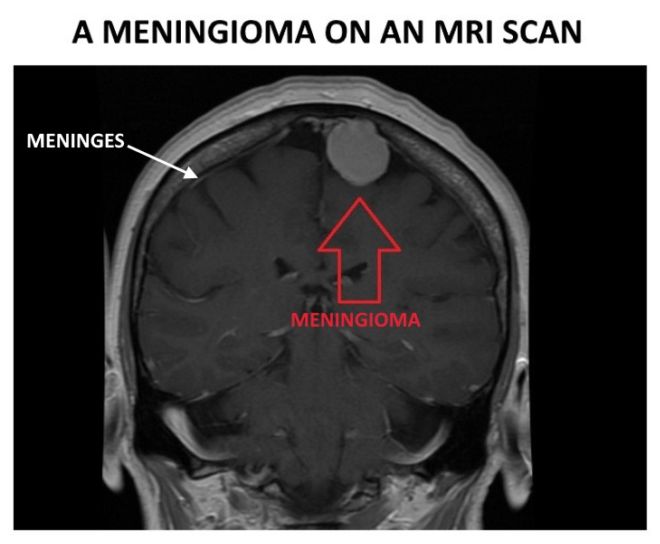Did you know that the most common brain tumor is benign in over 95% of cases? We’re talking about meningiomas, a type of brain tumor that develops in the protective tissues that cover the brain and spinal cord called the meninges. Most meningiomas are diagnosed in people who are 45 and older, with women being more than twice as likely to develop these tumors than men. Less than 5% of meningiomas are caused by cancer, which makes them malignant since they usually grow much faster than benign ones.

But for the most part, meningiomas are slow-growing tumors, the majority of which are left undiagnosed because they are often too small to interfere with the brain’s functions.
However, bigger meningiomas, like the one you can see in the picture above, can compress the surrounding brain tissues, blood vessels, and nerves, and can cause a variety of strange symptoms or even be fatal. These symptoms vary greatly, as they depend on the size of the tumor. We discuss the symptoms of meningioma below:
1. Weakness or Numbness in the Limbs

If the tumor is developing near the motor centers of the cortex, it may manifest itself in a sense of fatigue, weakness and even numbness, particularly in the limbs.You can experience these symptoms in either the left or right side of the body, one limb, or the whole body. A meningioma on the spinal cord may also press on the nerves, which may manifest itself through pain in the back or the limbs.
2. A Change in Personality or Behavior
Meningiomas that disrupt the flow of cerebrospinal fluid and those adjacent to the frontal part of the brain called the prefrontal cortex have been observed to change the behavior and personality of patients who have them, with severe cases mimicking symptoms of mental illness, particularly depression and psychosis.
And while a very small percentage of meningioma patients actually experience hallucinations or exhibit acute depressive symptoms, more patients can suddenly change their hobbies, become more abrupt, more secluded, or more emotional depending on the size and place of the tumor.
3. A Sudden Worsening or Loss of Senses
Patients with meningiomas frequently experience disturbances with their senses:
Visual symptoms vary from blurry or double vision to a sudden loss of eyesight, typically in one eye.
Hearing symptoms also depend on the location and severity of the tumor, causing anything from an echo-y hearing, hearing loss and even sound hallucinations.
The sense of smell may also suffer and decrease or disappear as the result of a meningioma.
4. Confusion and Seizures
Patients with this type of tumor sometimes experience cognitive disturbances, which can become apparent when a patient feels dizzy, confused or has seizures. This happens with patients who have large meningiomas in the mid or frontal part of their brain, that constrict some nerves or brain tissues.
These patients can also experience cognitive decline and find it difficult to understand things. Seizures only on one side of the body can occur with patients who have a meningioma near their cerebellum as well. A meningioma-related seizure can change your sense of smell or vision or can make you pass out or have jerking muscle movements or stiffness.
5. Headaches That Become Worse with Time



